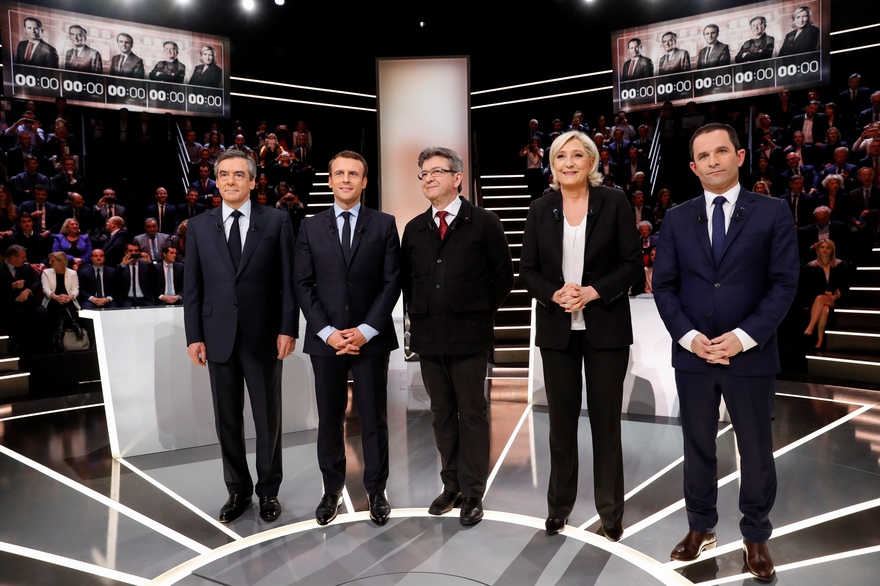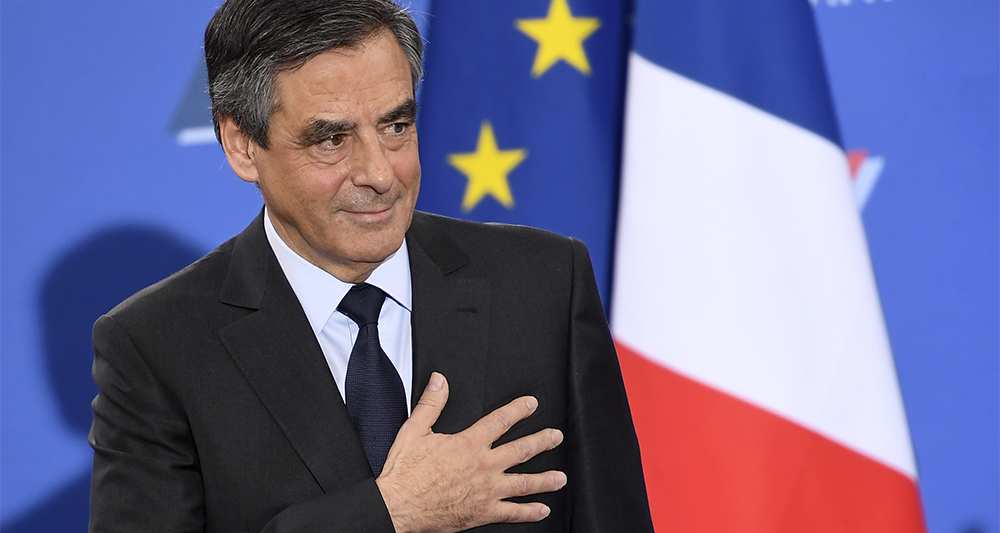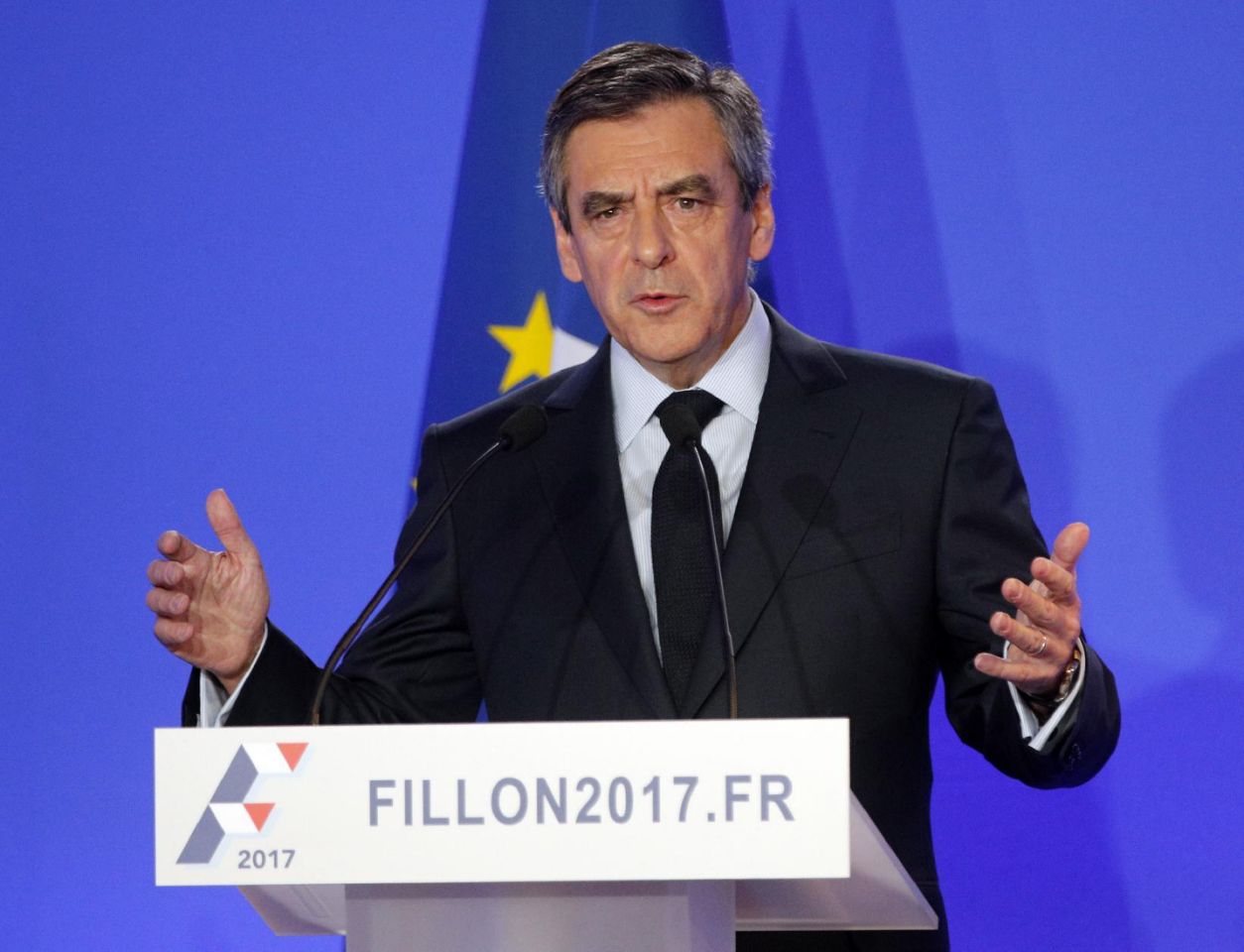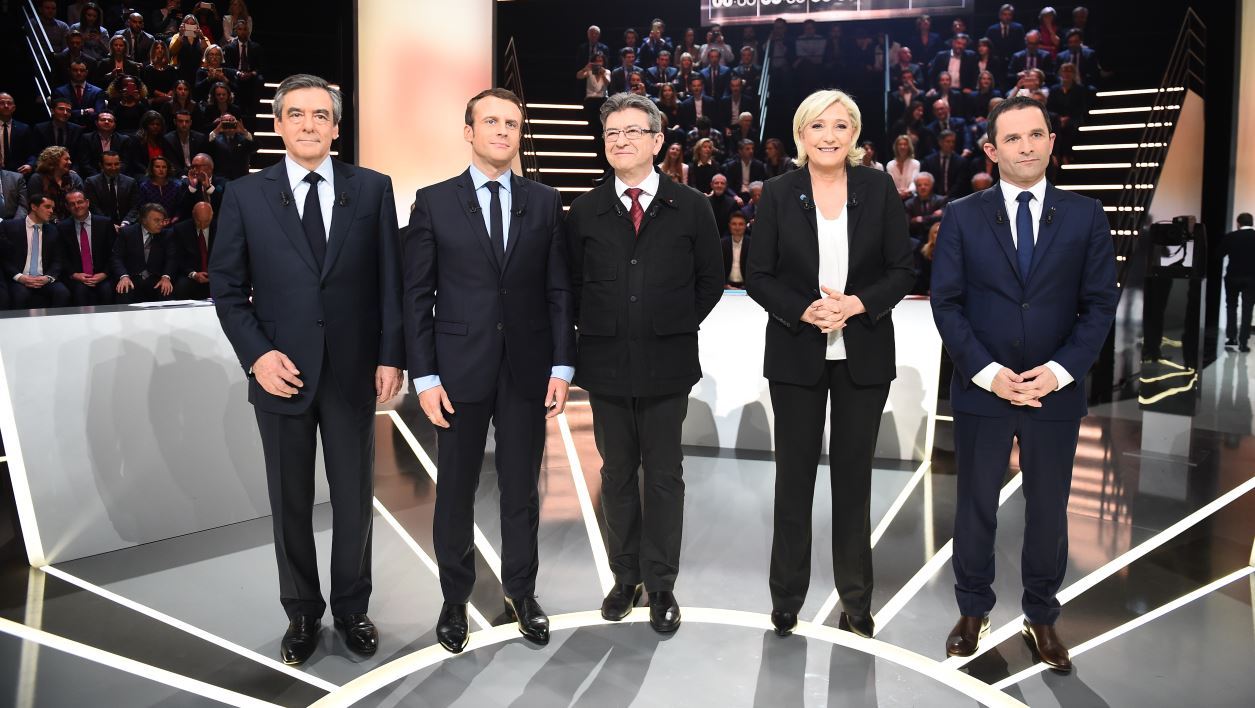World News Actuality Presented By Claire Evren
World News Actuality French Presidential 2017
- World News Actuality Presented By Claire Evren – French presidential election candidates, right-wing Les Republicains (LR) party Francois Fillon, En Marche ! movement Emmanuel Macron, far-left coalition La France insoumise Jean-Luc Melenchon, far-right Front National (FN) party Marine Le Pen, and left-wing French Socialist (PS) party Benoit Hamon, pose before a debate organised by the French private TV channel TF1 on March 20, 2017 in Paris.
To elect the new French president, voters go to the polls twice. Unless one can get a majority of more than 50 per cent of the vote in the first round (held on April 23rd this year), the two candidates who receive the highest scores face each other in the run-up (May 7th).
Elections are always held on Sundays in France.
The campaigns end at midnight the Friday before the election, then on election Sunday by law no polls can be published and no electoral publication and broadcasts can be made.
Here are the five candidates who have been regularly polling at more than 10 per cent of the vote.
French Presidential Debate – Presidential Candidates: François Fillon, Republicans, centre right. Emmanuel Macron, independent, centrist. Marine Le Pen, National Front, far-right. Jean-Luc Melenchon, France Insoumise, far-left and Benôit Hamon, Socialist, centre left.
The three-and-a-half-hour live debate between the top five candidates
At the start of the debate, Fillon mostly quiet but with a few strong moments, particularly on pensions and foreign policy. Macron, the 39-year-old former economy minister, seemed enthusiastic, more used to making speeches alone on stage than debating rivals. But when Le Pen accused him of being in favour of the burkini, Macron exploded.
“You are lying by twisting the truth,” he said, accusing her of “dividing” society. Later, she attacked Macron for being a former investment banker, then again on foreign policy, “What you’re saying means nothing. We don’t understand any of it.”
For much of the debate, Fillon stood back, attempting to look reserved and presidential. He didn’t tackle Le Pen on immigration or security, but then he savaged her plans to leave the euro. “You want to drag the country into social and economic chaos,” he told Le Pen.
“That’s called Project Fear, Mr Fillon. It was used before Brexit,” shot back Le Pen, who has pledged a referendum on France’s EU membership.
Macron, staunchly pro-Europe, noted that “all those who said Brexit will be wonderful … ran away and hid”.
Francois Fillon, The Republicans
When Mr Fillon, won his centre-right party’s nomination for the presidency he immediately became the favourite.
Fillon: “I am the only candidate which can bring about a national recovery. A real change of politics is needed and I’m the only one who could have a stable majority to deliver it. I have experience, and the will to do this”.
Francois Fillon, the right’s candidate to be president, wants to cut bureaucracy and free up businesses to hire more staff.
Fillon, a former prime minister, concluded the debate by saying: “I have some flaws. Who hasn’t? But I know how to run a small town, a region, a government.”
Macron: Thank you for this debate. I want to reconcile opinions. Our country is divided, by fear, and by the way some people play on fear. You are not the problem – the problem is that the established order is not the right one. I propose pragmatism, with zero tolerance. My project is one that will make France proud. Profound change, that’s our project. It’s a profound renewal of French politics. I want France, our country, to offer a chance – a chance for each and every one of you.
Le Pen stressed security and immigration issues. “I want to put an end to immigration – that’s clear,” she announced, before talking about a rise of Islamic fundamentalism in France and saying the security situation in France was “explosive”.
Mélenchon: We cannot affront the threats the world faces with hands tied by money. I want to give the republic back to France by relieving it of this presidential monarchy. I am ready for this responsibility … to put in place a programme that will upset lots of vested interests.
Hamon: I’m offering you a vote that will be useful to you, your children, your grandchildren. You are used to voting against; I suggest you vote for: for the environment, for purchasing power for the poorest families; for a sixth republic; for a desirable future.
For most French, François Fillon is the only candidate with a believable and operational programme.
French Presidential Candidates
François Fillon, Republicans, centre right. Emmanuel Macron, independent, centrist. Marine Le Pen, National Front, far-right. Jean-Luc Melenchon, France Insoumise, far-left and Benôit Hamon, Socialist, centre left.
- World News Actuality By Claire Evren French Presidential Election 2017 For most French, François Fillon is the only candidate with a believable and operational programme.
François Fillon
Les Républicains
Socially conservative, former prime minister previously seen as favourite after a resounding win in the right’s primary.
For most French, François Fillon is the only candidate with a believable and operational programme.
François Fillon: The winner of the Republicain primaries quickly took on the status of the leading man.
Labour and welfare
Scrap France’s 35-hour week and allow companies to negotiate staff working hours. Boost businesses by reducing corporate taxes by €40bn (£35bn). Raise the retirement age from 62 to 65. Put a progressive cap on unemployment benefits. Reform the labour code to allow more flexibility for businesses. Reduce social charges on the lowest salaries.
The state, finances and society
Reduce public spending by €100bn in five years. Cut 500,000 public sector jobs, or 8% of the public sector workforce. Increase public sector working hours from 35 to 39 hours a week in areas such as health and state administration. Reform social security coverage and health system payments. Streamline benefits by introducing a single payment. Cut benefits to families if a child skips school or commits anti-social behaviour.
Bring back school uniform. Rewrite school history teaching to give more sense of the glorious moments of French history. Maintain the ban on medically assisted procreation such as IVF and the use of sperm donors for single women and women in same-sex relationships. Limit parental rights for same-sex couples.
Europe
Reform the Schengen travel accords to tighten control of the EU’s external borders. Stronger EU cooperation on defence. A political leadership of the eurozone by heads of state and government, with regular summits of eurozone leaders. A stridently positive policy towards Russia. Fillon said before winning his party’s primary race that Moscow was no threat and should be a partner in Syria and that European sanctions should be lifted.
Immigration
Annual quotas set by parliament to keep immigration to a strict minimum. Limit the ability of foreigners to join family members in France. Limit the ability of foreigners to gain French nationality. Renegotiate the Le Touquet accords, the –deal with Britain that keeps border checks, and thousands of refugees and migrants – on the French side of the Channel at Calais. Speed up asylum applications.
Crime and security
Set age of criminal responsibility at 16. Create 16,000 new prison places. Hire 5,000 more police and redeploy another 5,000. Bring intelligence services under one umbrella. Withdraw French nationality from jihadis and prevent them from returning to France. Expel convicted foreign criminals. Set defence spending at 2% of GDP.
Environment
Scale up nuclear energy sites and close coal-fired power stations. Amend the environmental charter added to the French constitution by Jacques Chirac in 2005 that states that if an action is deemed to pose a serious and irreversible threat to the environment, the state can intervene to stop it. Fillon argues that scrapping the clause will allow more innovation on environmental issues. He has also said it is “criminal” for France to ban research on shale gas.
François Fillon
Fillon was Prime Minister of France from 2007 to 2012, during the presidency of Nicolas Sarkozy. He previously served as a minister in the governments of Edouard Balladur, Alain Juppé and Jean-Pierre Raffarin. In this respect, he can hardly be seen as “new blood”. However he has a reputation as a reformer. In 2003 he made a first serious attempt to reform France’s much-criticized retirement laws, by bringing public sector retirement rules in line with those governing the private sector.
In 2004-2005, as education minister, he pushed through, in the face of considerable hostility, a reform of the French Baccalaureat.
As Prime Minister under Nicolas Sarkozy, he was somewhat in the shadows of the man people described as the “hyper-president”. Sarkozy was the conductor and the first violin of the orchestra of government; the role of Prime Minister became that of second fiddle. In 2010 he resigned as Prime Minister, but was promptly reappointed by Sarkozy who wanted to bring Alain Juppé back into the government. Juppé would not serve under those competing for Fillon’s post, so to bring on board Juppé and his many supporters, Sarkozy had to reappoint Fillon.
French Presidential Debate – Presidential Candidates: François Fillon, Republicans, centre right. Emmanuel Macron, independent, centrist. Marine Le Pen, National Front, far-right. Jean-Luc Melenchon, France Insoumise, far-left and Benôit Hamon, Socialist, centre left.
- World News Actuality Presented By Claire Evren – French presidential election candidates, right-wing Les Republicains (LR) party Francois Fillon, En Marche ! movement Emmanuel Macron, far-left coalition La France insoumise Jean-Luc Melenchon, far-right Front National (FN) party Marine Le Pen, and left-wing French Socialist (PS) party Benoit Hamon, pose before a debate organised by the French private TV channel TF1 on March 20, 2017 in Paris.






